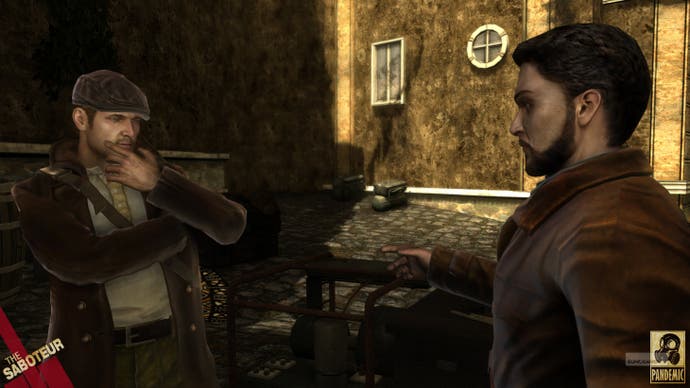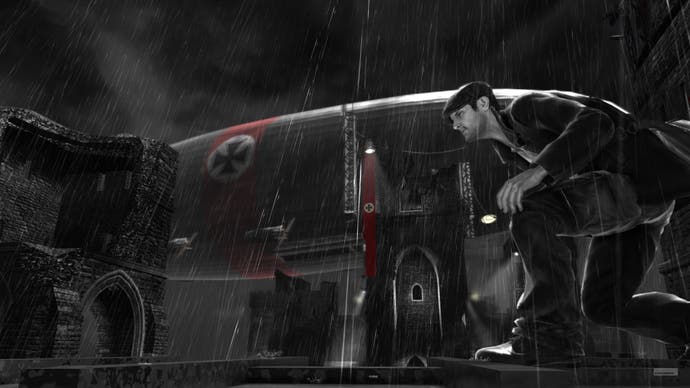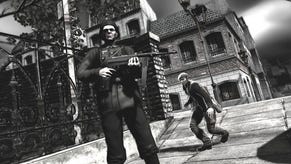The Saboteur
Resistance is futile.
Apologies for mangling a quote I can only half remember, but I'm pretty sure someone clever once said the true appeal of fascism is largely aesthetic. That's a fairly depressing notion: the 'philosophy' that reduced so much of Europe to a crumbling cinder was, at least in part, born from Hitler being crazy enough to have an idea about how the world should actually look.
It's also a theme that gives The Saboteur its one big idea. Pandemic's final game stages the fight for the soul of occupied Paris primarily as a battle between different fashion houses, pitting the nasty militaristic chic of the National Socialists against Sean Devlin - a man clad in rustic hues who appears to have been kitted out by the Edinburgh Woollen Mill.
At the start of the game Paris is beautiful, swathed in stylish black and white and shot through with the blood red flags and banners of the Nazi party. By the end the city of light is just a big brown blur: far, far uglier, yet presumably now free of the deadly elegance of the Jackboot.
The game lurking under this war of art designs is slightly wonky - if charmingly so, by and large. While it certainly isn't perfect, you can at least applaud the fact that it's a World War II title which doesn't force you to plod through the Normandy Landings yet again. Instead this is conflict drawn in urban espionage and deadly tricks: a close-up battle set in an open world, paid out slowly in missions from various anti-fascist factions.

Whatever Saboteur's strong points, the story isn't one of them. There are smart moments, such as the restaging of the outbreak of fighting in Europe as a higgledly-piggledy car chase through the burning fields of France, but they're fairly thin on the ground. EA casts you as Sean Devlin, a swarthy Irish biffer cutting a swathe through occupied Paris in order to avenge the death of his idiotic French chum Jules, who got his head tortured off following an ill-considered frat prank in which they drove a high-ranking SS officer's fancy motor off a cliff. Amazingly, I am not making this up.
In order to get to his target, Devlin ends up, you know, freeing most of Paris from the yoke of oppression. While the history books may not remember that the battle for the West was largely fought by a drunken auto mechanic who entered most shootouts yelling, "Top o' the mornin' to ya!" it's something players will struggle to forget.
Pandemic was presumably aiming for a kind of rough-and-ready Gerard Butler-style charm with its protagonist. The big problem is that Devlin is actually kind of a tool, and that means if you want to play Saboteur you're going to have to be kind of a tool as well. Despite the fact that he closely resembles DJ Mark Radcliffe he's hard to warm to initially, a smirking presence in a flat cap who spouts cartoon Irishisms at you unless you press the B button in time during cut-scenes, and who otherwise stumbles through a script so bad you start to suspect Pandemic littered it with all those F-bombs so sarcastic reviewers couldn't quote much of it to you.
Lots of games have had lead characters as muddled as Devlin, of course - even if the idea of an Irishman who expresses his heroism by sticking explosives to things was always going to have an extra challenge to overcome for a British audience. Saboteur's jarring non-sequiturs, glaring anachronisms (at one point Devlin makes a joke about groupies, which would have been perfect if the Second World War was fought in Haight Ashbury in 1967) and rambling cut-scenes are hardly firsts in an open-world game, but they serve to highlight the fact that Saboteur really can't decide what it wants to be.

Naturally it's got trademark Pandemic quirks like resistance leaders who jog backwards into cut-scenes, mission kick-offs that arrive once the skirmish is already over, and the completely surreal moment when a courier caught me at the bottom of a ditch moments after I'd driven off a railway bridge, just to give me a message about street-racing from a sexy lady. It's still not as broken as the hovering-crate paradise that is Mercenaries 2, but it's not as incidentally witty and personable either.
After a few hours of bland "Go here, blow this up" missions, you suddenly find yourself in an elaborate homage to Raiders of the Lost Ark. It's possible, at this point, that you're getting a fleeting glimpse of what Pandemic really wanted to do with this game - create a knockabout blue-collar matinee adventure - while simultaneously receiving an insight into how short of the mark the team fell.
So what do you get? You get Grand Theft Auto III crossed with 'Allo 'Allo: an open-world mission-based game based in a cobbled muddle of Parisian streets, in which you can accept objectives from a handful of different factions, stealth-kill Nazis and don their disguises, race cars about, driving through German checkpoint barriers and generally work to take back the city, winning crucial battles in the game's various Fightback Zones while unlocking a range of perks to help you on your way.









